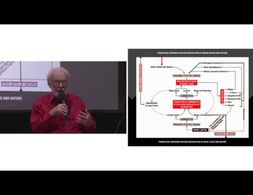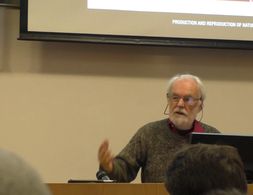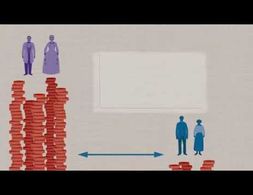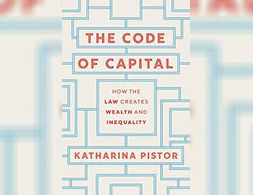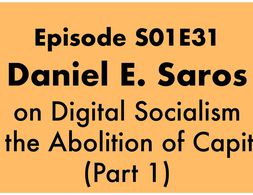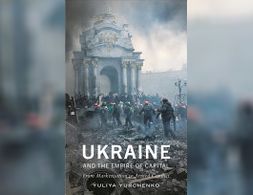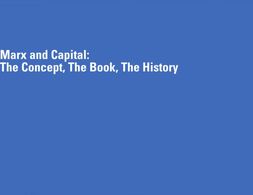✕
435 results
The book’s central theme is to develop a new theory of speculative capital related to other forms of capital, the world market, and the state. Unlike most marxist and heterodox theories, the book distinguishes credit and fictitious capital from speculative capital to show its hegemony today in the capital markets.
This edited volume presents a collection of articles that engage with various concepts from Marx’s Capital and Marxian theory in general, from a ‘Southern’ perspective. The book engages with four specific themes: “Reception of Capital in the East; Value, Commodity, Surplus Value and Capitalism; Population and Rent in Capital; and Issues Beyond Capital”.
By conducting a discourse analysis (SKAD) in the field of academic economics textbooks, this paper aims at reconstructing frames and identity options offered to undergraduate students relating to the questions ‘Why study economics?’ and ‘Who do I become by studying economics?’. The analysis showed three major frames and respective identity offerings, all of which are contextualized theoretically, with prominent reference to the Foucauldian reflection of the science of Political Economy. Surprisingly, none of them encourages the student to think critically, as could have been expected in a pedagogical context. Taken together, economics textbooks appear as a “total structure of actions brought to bear upon possible action” (Foucault), therefore, as a genuine example of Foucauldian power structures.
In the second video of the series Investigating International Finance, an alternative view on capital controls is given contrasting with the paradigm of classical trade theory suggesting that the removal of trade and capital barriers is associated with higher market efficiency. After explaining the conceptual mechanisms underlying capital controls, examples are introduced where countries actually apply capital controls and how these controls have been associated with a lesser exposure to international financial crises spillovers.
The most successful multialternative theories of decision making assume that people consider individual aspects of a choice and proceed via a process of elimination. Amos Tversky was one of the pioneers of this field, but modern decision theorists – most notably Neil Stewart – have moved things forward. At the current stage the theories are able to explain a number of strictly ‘irrational’ but reasonable quirks of human decision making, including various heuristics and biases. Not only this, but eye movements of participants strongly imply that the decision-making process depicted in the theories is an accurate one.
In this lecture Mirowski claims that a good critique of and alternative to neoclassical economics should focus on microeconomics. In addition, he claims that mainstream economics is not about a specific "human nature", instead the understanding of markets (partially based on Hayek) is of special importance. As an alternative Mirowski proposes institutionalist economics that builds upon how markets work nowadays (e.g. links to computer science).
In this podcast, Nalia Kabeer talks about her work, criticising the way in which Randomized Control Trials (RCTs) is adopted as a sole form of impact assessment. At the beginning of the talk, she briefly describes The Ultra Poor Project (the context of her study), RCTs and its critiques (such as lack of acknowledgement of human agency, heterogeneity, and social context); also, the problem that most RCTs practitioners do not allow for qualitative research conducted in an integrated way as it might cause their studies “being contaminated.”
This multimedia dossier is part of the series „Understanding Finance“ by Finance Watch and explores the following questions: What is bank capital and how is it regulated? It further presents controversies on the size of bank capital in the aftermath of the financial crisis and on how bank capital affects economic activity.
Marxist scholar David Harvey explains key concepts of capital from Marx. Applying Marx's analysis of capital to today's world, showing both the longevity and relevance of Marx's Capital, 150 years after its publication.
Human Rights Economics strives for an economic system that is just for people and respectful of the planet that promotes social and economic justice that integrates a plurality of views and traditions and that is human rights consistent in both its processes and outcomes It posits that economics is blind …
This paper attempts to clarify how the European economic crisis from 2007 onwards can be understood from the perspective of a Marxian monetary theory of value that emphasizes intrinsic, structural flaws regarding capitalist reproduction. Chapter two provides an empirical description of the European economic crisis, which to some extent already reflects the structural theoretical framework presented in chapter three. Regarding the theoretical framework Michael Heinrich's interpretation of 'the' Marxian monetary theory of value will be presented. Heinrich identifies connections between production and realization, between profit and interest rate as well as between industrial and fictitious capital, which represent contradictory tendencies for which capitalism does not have simple balancing processes. In the context of a discussion of 'structural logical aspects' of Marx's Critique of the Political Economy, explanatory deficits of Heinrich's approach are analyzed. In the following, it is argued that Fred Moseley's view of these 'structural logical aspects' allows empirical 'applications' of Marxian monetary theories of value. It is concluded that a Marxian monetary theory of value, with the characteristics of expansive capital accumulation and its limitations, facilitates a structural analysis of the European economic crisis from 2007 onwards. In this line of argument, expansive production patterns are expressed, among other things, in global restructuring processes, while consumption limitations are mitigated by expansive financial markets and shifts in ex-port destinations.
Professor David Harvey presents a complete visual representation of the flow of capital in all its forms. Similar to the Water Cycle diagrams, Harvey models the economics of production, consumption, human reproduction, labor, private business, and government redistribution.
Thomas Piketty's Capital in the 21st century is presented and the central argument that capital returns have historically exceeded growth rates, thus exacerbating inequality is illustrated.
The economist Thomas Piketty presents a central argument of his book Capital in the Twenty-First century: if the rate of return to capital generally exceeds an economy's growth rate, this leads to a higher concentration of wealth in the long run. He furthermore shows with historical data how wealth and income inequality increased within the past decades.
The concept of financialisation has undergone a similar career as ‘globalisation’, ‘neoliberalism’ or even ‘capitalism’, in the course of which it changed from the explanandum to the explanans; the process of financialisation is taken for granted, while the concrete historical and empirical causal conditions of its realisation and perpetuation are being moved into the background.
In the second video of the series Investigating International Finance, an alternative view on capital controls is given contrasting with the paradigm of classical trade theory which suggests that the removal of trade and capital barriers is associated with higher market efficiency. After explaining the conceptual mechanisms underlying capital controls, examples are introduced where countries actually apply capital controls and how these controls have been associated with a lesser exposure to international financial crises spillovers.
In this revealing book, Katharina Pistor argues that the law selectively “codes” certain assets, endowing them with the capacity to protect and produce private wealth. With the right legal coding, any object, claim, or idea can be turned into capital—and lawyers are the keepers of the code.
In his 2010 published book “The Enigma of Capital and the Crises of Capitalism” multi-talented US geographer, anthropologist and Marxist economist David Harvey aims to analyse the capitalist system that has shaped western society and the globalized world of today.
The 2007–08 credit crisis and the long recession that followed brutally exposed the economic and social costs of financialization. Understanding what lay behind these events, the rise of “fictitious capital” and its opaque logic, is crucial to grasping the social and political conditions under which we live. Yet, for most people, the operations of the financial system remain shrouded in mystery.
This brilliantly concise book is a classic introduction to Marx’s key work, Capital. In print now for over a quarter of a century, and previously translated into many languages, the new edition has been fully revised and updated, making it an ideal modern introduction to one of the most important texts in political economy.
"First published more than a decade ago, Globalizing Capital has remained an indispensable part of economic literature. This classic book emphasizes the importance of the international monetary system for understanding the international economy. The second edition, published in October 2008, has consistently appeared on syllabuses since its release
While many are unsatisfied with capitalism and critique it in highly sophisticated ways, there are few concrete proposals for a socialist mode of production that could replace the capitalist one. Daniel E. Saros has developed such a proposal in his book "Information Technology and Socialist Construction – The End of Capital and the Transition to Socialism" which we discuss at length over the course of two episodes.
Marxian Political Economy focuses on the exploitation of labour by capital. The economy is not conceived as consisting of neutral transactions for exchange and cooperation, but instead as having developed historically out of asymmetric distributions of power, ideology and social conflicts.
This website belongs to PolyluxMarx and provides open access material for use while reading Karl Marx Capital For several years now people have been starting to dust off Marx and return to his analysis of society This is mainly due to the social turmoil in global capitalism weaknesses in prevailing …
These notes aim to clarify some basic features and implications of gross capital flows In the context of the 2007 08 Global Financial Crisis and the 2010 12 Eurozone Crisis trade imbalances and capital flows received a lot of attention from academics policymakers and the media However there is still …
In this book, Carlota Perez develops her Neo-Schumpeterian concept of "techno-economic paradigms" which captures the patterns underlying the role of technological revolutions in economic development since the Industrial revolution.
David Harvey is a Distinguished Professor of Anthropology Geography at the Graduate Center of the City University of New York CUNY the Director of Research at the Center for Place Culture and Politics and the author of numerous books He has been teaching Karl Marx s Capital for nearly 50 …
Those who control the world’s commanding economic heights, buttressed by the theories of mainstream economists, presume that capitalism is a self-contained and self-generating system.
From Marketisation to Armed Conflict Since 1991 nominally independent Ukraine has been in turmoil with the Orange Revolution and the Maidan protests marking its most critical moments Now its borders are threatened and the civil unrest and armed conflict continue to destabilise the country In order to understand these dramatic …
In this video, Clara Mattei investigates the function of austerity in relation the stabilization of capitalism as a form of social order build around private property, wage labor and class relations. In order to develop this argument, she situates austerity in the history of World War 1 and its revolutionary aftermath. Zooming in on the politicization of the economy and the associated threat to class society that emerged in the period, she highlights how austerity was a „tool of reaction“ that was successful in curtailing demands for economic democracy and a society free from class oppression.
Source image GC Videography Fellows Youtube channel David Harvey davidharvey org City University of New York
This course introduces students to the relevance of gender relations in economics as a discipline and in economic processes and outcomes. The course covers three main components of gender in economics and the economy: (1) the gendered nature of the construction and reproduction of economic theory and thought; (2) the relevance and role of gender in economic decision-making; and (3) differences in economic outcomes based on gender. We will touch on the relevance of gender and gender relations in at least each of the following topics: economic theory; the history of economic thought; human capital accumulation; labor market discrimination; macroeconomic policy, including gender budgeting; household economics; basic econometrics; economic history; and economic crises.
We use cookies on our website. Click on Accept to help us to make Exploring Economics constantly better!









